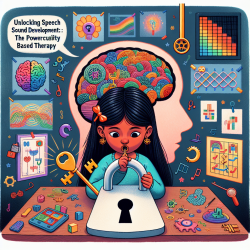As a speech-language pathologist (SLP) committed to creating the best outcomes for children, staying informed about the latest research is essential. One such pivotal study is the meta-analysis review titled Effect of Complexity on Speech Sound Development: Evidence From Meta-Analysis Review of Treatment-Based Studies. This research provides invaluable insights into how complexity-based approaches can significantly enhance speech sound development in children with speech sound disorders (SSDs).
The Core Findings
The meta-analysis, which reviewed 12 treatment-based studies, demonstrated that exposing children to complex speech sounds not only improved their production of these sounds but also facilitated the generalization to untreated, simpler speech sounds. The effect sizes were substantial:
- Improvement in treated complex speech sounds: d = 1.08
- Generalization to untreated simple speech sounds: d = 2.69
These findings suggest that starting with complex stimuli can lead to broader improvements across a child's phonological system, aligning with theories of language learnability.
Practical Implications for SLPs
For practitioners, these findings highlight the importance of incorporating complexity-based approaches into therapy sessions. Here are some actionable steps to consider:
- Incorporate Complex Stimuli: Introduce more marked, complex speech sounds in therapy. For example, start with fricatives or consonant clusters rather than simpler sounds like stops.
- Focus on Generalization: Monitor not only the treated sounds but also the generalization to untreated sounds. This broader perspective can help assess the overall efficacy of the treatment.
- Utilize Single-Case Experimental Designs (SCEDs): Given the heterogeneity in phonological profiles among children with SSDs, SCEDs can provide robust data by evaluating participants at multiple time points, thereby serving as their own controls.
Encouraging Further Research
While the meta-analysis provides strong evidence supporting complexity-based approaches, variability in study designs and participant characteristics suggests the need for further research. Future studies should aim to:
- Employ randomized controlled trials to enhance the level of evidence.
- Explore the efficacy of complexity-based approaches across different languages and subtypes of SSDs.
- Investigate the impact of various modes of service delivery (e.g., home-based, school-based, clinic-based).
By continuing to build on this research, we can refine our approaches and ensure that we are providing the most effective interventions for children with SSDs.
Conclusion
The meta-analysis review underscores the transformative potential of complexity-based therapy for children with speech sound disorders. By integrating these findings into your practice, you can help foster significant improvements in your young clients' speech sound development.
To read the original research paper, please follow this link: Effect of Complexity on Speech Sound Development: Evidence From Meta-Analysis Review of Treatment-Based Studies.










